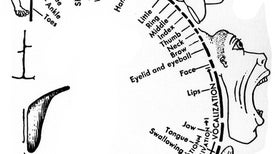
New Execution Method Touted as More ‘Humane,’ but Evidence Is Lacking
A legal battle over nitrogen hypoxia, a new potential method of execution, raises ethical questions
Dana Smith is a freelance science writer specializing in brains and bodies. She has written for Scientific American, the Atlantic, the Guardian, NPR, Discover, and Fast Company, among other outlets. In a previous life, she earned a Ph.D. in experimental psychology from the University of Cambridge.

A legal battle over nitrogen hypoxia, a new potential method of execution, raises ethical questions

A computer model simulating how objects react to physical forces approximates how babies understand their surroundings

Gender bias turns up in the way we think of the most neutral of words

The homunculus of textbook fame still does not take into account the relevant locations in the cerebral cortex that process touch for the sex organs

Baby-brain-scanning experiments fuel the debate over whether humans are born with these abilities

This basic ability gives humans a leg up on computers

On its own, the neural network seems to recap a process experienced by human infants

Loss of collagen protein depletes renewal cells that serve as skin’s fountain of youth

Collaborations between followers of opposing ideologies lead to less biased, higher quality Wikipedia pages

Psychiatrist Randolph Nesse, one of the founders of evolutionary medicine, explains why natural selection did not rid our species of onerous psychiatric disorders

The technology utilizes smartphone speakers and microphone to monitor breathing

The disturbingly high rate may arise from a disconnect between women’s ambitions and societal expectations, experts say

Prolonged social isolation can do severe, long-lasting damage to the brain

Three studies in rodents suggest prenatal exposure to the drug may pose risks for infants

An analysis of 1.5 million people tries to more accurately categorize people’s character traits

A novel drug is intended to help women who suffer from depression after childbirth

A 1-degree Celsius rise corresponded to a 1.4 percent increase in suicides

Genes and pregnancy problems combine to increase significantly the likelihood of developing schizophrenia

New research explains why relationships take up so much of our mental energy

Despite the conventional wisdom, a new study shows picking up the subtleties of grammar in a second language does not fade until well into the teens
Support science journalism.

Thanks for reading Scientific American. Knowledge awaits.
Already a subscriber? Sign in.
Thanks for reading Scientific American. Create your free account or Sign in to continue.
Create Account